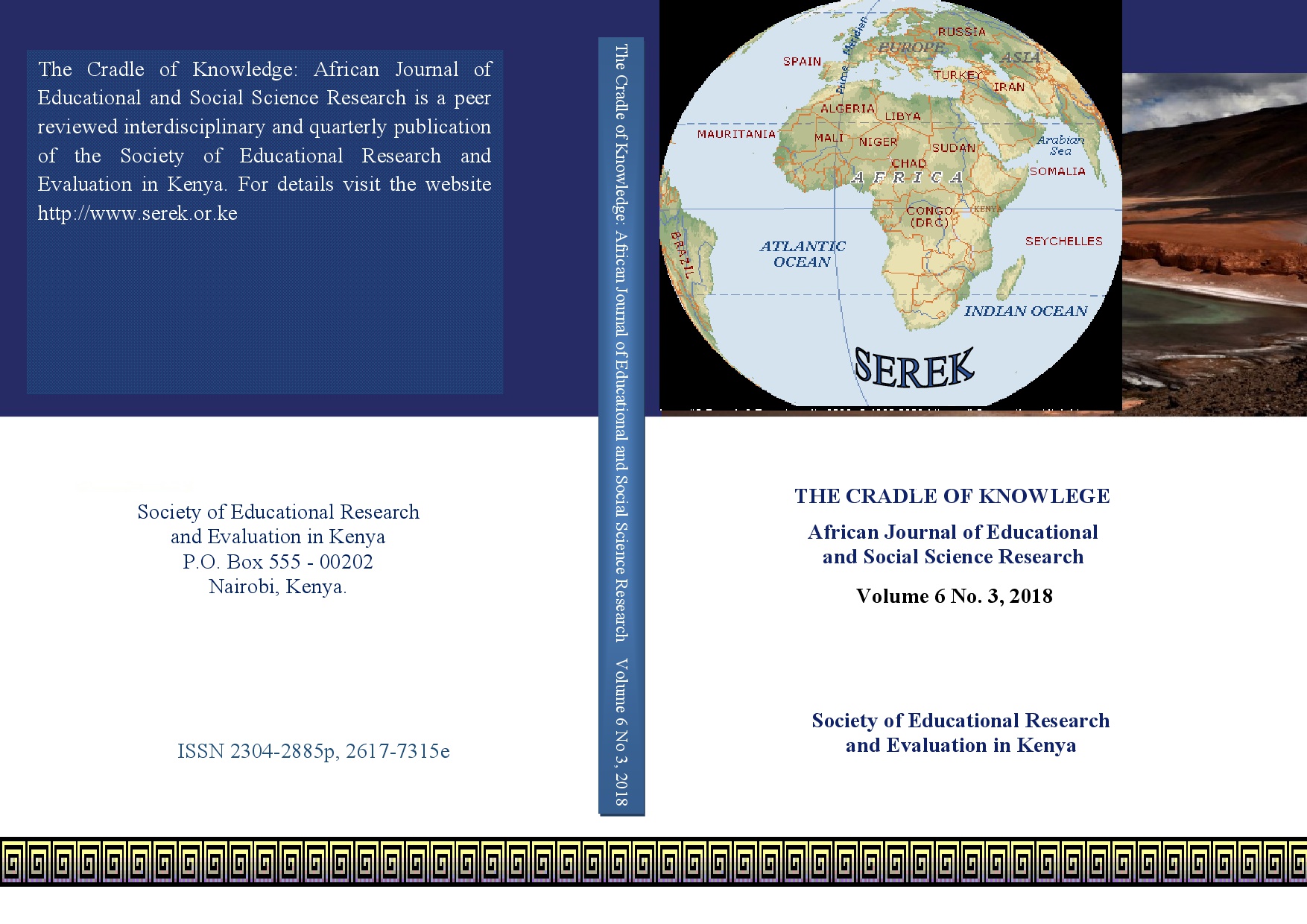
Affluent Parents’ Behaviour and Adolescents’ Levels of Assertiveness in Karen Zone, Nairobi County, Kenya
Abstract
Full Text:
PDFReferences
Becker, B. E. (2012). Privileged but Pressured: A Study of Affluent Youth. Child Development, 73, 1593–1610. doi:10.1111/1467-8624.00492beginning researchers. Boston: Option Press. June, 9, 2016 Chen, C., Lee. M. & Stevenson, K. (2013). Family Relationships and Adolescent Psychosocial Outcomes. Converging Findings from Eastern and Western Cultures. Journal of Research on Adolescence, (6), 6287.Retrieved from https://www.psychologytoday.com/articles/201310/the-problem-rich-kids counseling Services. March 23, 2017 Dearing, E. (2014). Is Growing up Affluent Risky for Adolescents or is the Problem Growing up in an Affluent Neighborhood? Journal of Research on Adolescence. doi:10.1111/j.1532-7795.2012. 00829.x. Erikson, E. (1963). Childhood and Society. New York: Norton.
Erikson, E. H. (1980). Childhood and Society. New York: W. W. Norton & Co Inc. Erikson, E. H. (1990). Identity, Youth and Crisis. New York:Norton. Holland, F. M. (2015). Parent-Child Relations and Children’s Psychological Well-Being: Do Dads Matter? Journal of Family Issues, 5, 26, (1), 55-78. KIPPRA. (2016, July 23rd). Tough New Rules to Curb School Strikes. Daily Nation, p. 1, Col. 2. Nairobi: Nation Media Group. Kiyingi, F. P. (2012). The Art of Parenting Integrated Children: Makere University: Kampala Lines, D. (2012). Brief Counseling in Schools: Olives Yard: Sage Publications Ltd. Luthar, S. S. (2013). The Culture of Affluence: Psychological Costs of Material Wealth.Donald Winnicott: Karnac Books. Luthar, S. S. (2010). The Problem with Rich Kids.Psychology Today, 46, (6), 62-87. Retrieved from https://www.psychologytoday.com/articles/201310/the-problem-rich-kids February 52017 Luthar, S. S. (2015). Children of the Affluent: Challenges to Well-being. Current Directions in Psychological Science, 14, 49–53. Ministry of Education. (2017). Towards a Globally Competitive Quality Education for Sustainable Development. Report of the Task Force. Nairobi: JKF MoE. (2016). Youth Agenda Strategic Plan, 2013-2018. Nairobi: Youth Agenda publishers. Moyo, J. (2012). Rapid Social Cultural Change and the Dilemma of Growing up in Kenya. Nairobi: JKF.
Mumah, J. (2014). Psychological Impact on Teenage Pregnancy among Adolescents in Nairobi’s Slum. Research Report Nairobi: Africa Population and Health Research Center Inc. Mwangi, J. K. (2016). Adolescent Suicide Cases in Nairobi County Kenya. What is the Way forward? Nairobi: JKF Okinda, P. M. (2018). The State of Marriage in Kenya. Nairobi: Nation Media Group Olweus, D. (2013). Bullying or Peer Abuse in Schools: Facts and Interventions, Current Directions in Psychological Science. London: Pinters. Rambo, C. (2016). Factors Influencing Drug and Substance Abuse among the Youth in Mbeere District, Kenya. Nairobi: JKF Relationships during Late Adolescence. Journal of Adolescent Research, 20, (4), 336-424. Uchenna, O. Z. (2013). Single-Parenting, Psychological Well-Being and Academic Performance of Adolescents in Lagos, Nigeria. Journal of Emerging Trends in Educational Research and Policy Studies (JETERAPS), 4, (1), 112-117 Ujo, M. O. D. (2013). A Sociological Review of Issues on Juvenile Delinquency.Journal of International Social Research, 5, (21), 465-482. Wealth in Kenya Report. (2017). Wealth in Kenya Report for Sustainable Development: Implementation Strategy. Nairobi: Senabora Design House. Wealth Report (2017). Global Monitoring Report. Retrieved online at www.cfr.org. Accessed on May 02, 2016.Psychiatry, 52, 196-204. doi:10.1016/j.jaac.2012.11. W.H.O (2017). United Nations Office for Control of Crime and Prevention. Bath Press, Great Britain. W.H.O. Publication (2014). The Health of Young People: A Challenge and a Promise.. Wadsworth WHO (2017). Adolescent-Parent Communication in Self-Harm. Journal of Adolescent Health, 21, 267-275
Refbacks
- There are currently no refbacks.
License URL: https://www.serek.or.ke
SEREK publication https://serek.or.ke
This work is licensed under a Creative Commons Attribution 4.0 International License